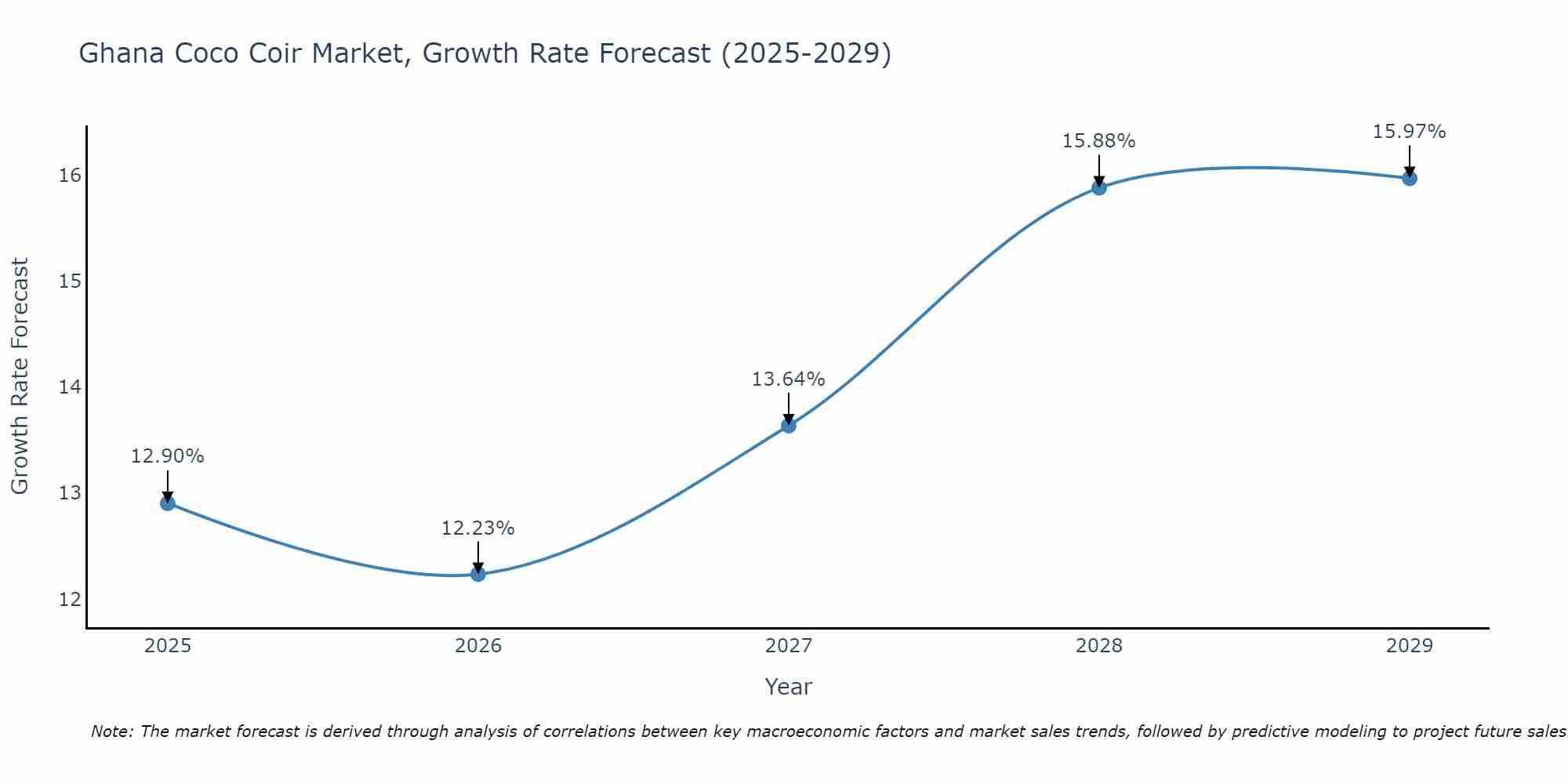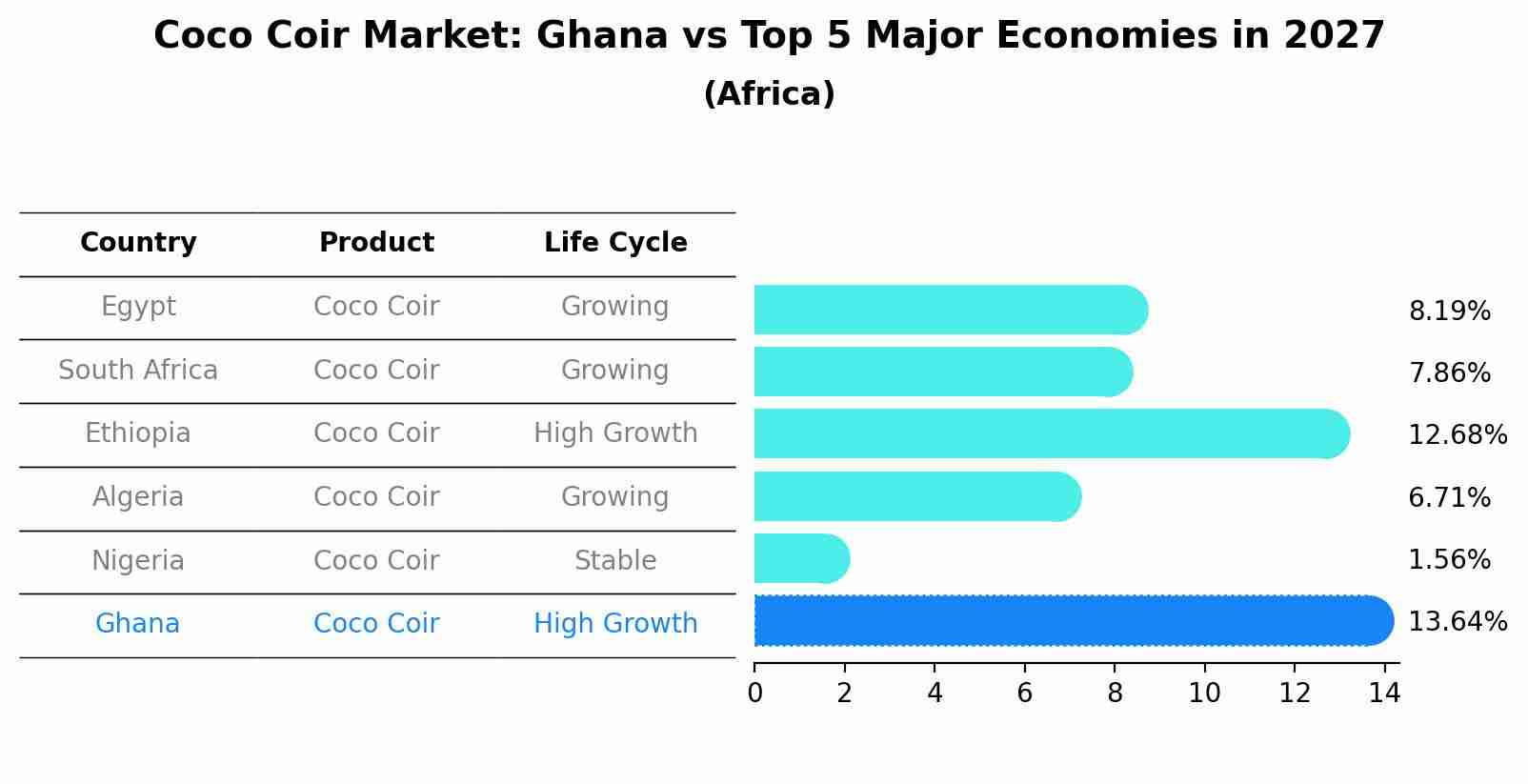Ghana Coco Coir Market (2025-2031) Outlook | Share, Companies, Industry, Value, Revenue, Size, Trends, Analysis, Growth, Forecast
| Product Code: ETC373736 | Publication Date: Aug 2022 | Updated Date: Jul 2025 | Product Type: Market Research Report | |
| Publisher: 6Wresearch | Author: Vasudha | No. of Pages: 75 | No. of Figures: 35 | No. of Tables: 20 |
Ghana Coco Coir Market Size Growth Rate
The Ghana Coco Coir Market is projected to witness mixed growth rate patterns during 2025 to 2029. Commencing at 12.90% in 2025, growth builds up to 15.97% by 2029.

Coco Coir Market: Ghana vs Top 5 Major Economies in 2027 (Africa)
The Coco Coir market in Ghana is projected to grow at a high growth rate of 13.64% by 2027, within the Africa region led by Egypt, along with other countries like South Africa, Ethiopia, Algeria and Nigeria, collectively shaping a dynamic and evolving market environment driven by innovation and increasing adoption of emerging technologies.

Ghana Coco Coir Market Synopsis
The Ghana Coco Coir Market is witnessing steady growth due to the rising demand for sustainable and eco-friendly agricultural products. Coco coir, a natural fiber derived from coconut husks, is increasingly being used as a soil amendment and growing medium in horticulture and agriculture. The market is driven by factors such as the growing awareness about the benefits of coco coir, including its water retention properties, biodegradability, and ability to enhance soil quality. Additionally, the government`s initiatives to promote organic farming practices and the increasing adoption of hydroponic farming techniques are further fueling market growth. Key market players in Ghana are focusing on product innovation and expanding their distribution networks to cater to the evolving needs of farmers and gardeners, thereby contributing to the overall expansion of the Ghana Coco Coir Market.
Ghana Coco Coir Market Trends
The Ghana Coco Coir Market is experiencing a growing demand due to its eco-friendly and sustainable properties. The trend towards organic farming practices and the increasing awareness of the benefits of using coco coir as a soil amendment are driving the market growth. Additionally, the rise in urban gardening and hydroponic farming methods is boosting the demand for coco coir products in Ghana. Market players are focusing on product innovation and expanding their product portfolios to cater to the diverse needs of agricultural and horticultural industries. Collaborations with local farmers and sustainable sourcing practices are becoming key strategies to establish a competitive edge in the market. Overall, the Ghana Coco Coir Market is poised for continued growth in the coming years.
Ghana Coco Coir Market Challenges
In the Ghana Coco Coir market, challenges include limited awareness and understanding of the product among local farmers, inadequate infrastructure for processing and distribution, and competition from traditional soil amendments. The inconsistent quality of coco coir imports due to varying suppliers can also pose challenges for buyers in terms of reliability and performance. Additionally, price fluctuations in the global market can impact the cost competitiveness of coco coir products in Ghana. Lack of government support and policies specific to the coco coir industry further hinder its growth and adoption. Overall, addressing these challenges will require concerted efforts from industry stakeholders to promote awareness, improve quality control measures, enhance distribution networks, and advocate for supportive policies to drive the growth of the Ghana Coco Coir market.
Ghana Coco Coir Market Investment Opportunities
The Ghana Coco Coir Market presents attractive investment opportunities due to the increasing demand for sustainable and eco-friendly agricultural products. Coco coir, a byproduct of coconut husks, is widely used as a growing medium in horticulture and agriculture due to its water retention properties and environmental benefits. Investors can consider opportunities in coco coir production facilities, distribution networks, and value-added products like coco peat and coco chips. The market is poised for growth as more farmers and gardeners in Ghana and globally adopt coco coir for its superior qualities compared to traditional soil-based mediums. Additionally, the government`s support for the agricultural sector and initiatives promoting sustainable practices further enhance the investment potential in the Ghana Coco Coir Market.
Jordan Agar Market Government Policies
The government of Ghana has implemented policies to support and regulate the coco coir market in the country. These policies focus on promoting sustainable agriculture practices, ensuring fair trade practices, and enhancing market access for coco coir products. The government has provided financial incentives and technical support to coco coir producers to improve production efficiency and product quality. Additionally, regulations have been put in place to monitor and control the quality and safety standards of coco coir products to maintain consumer trust. The government`s efforts aim to position Ghana as a key player in the global coco coir market while also prioritizing environmental sustainability and economic development within the industry.
Ghana Coco Coir Market Future Outlook
The future outlook for the Ghana Coco Coir Market appears promising as demand for sustainable and eco-friendly alternatives to traditional peat moss continues to rise globally. With its multiple benefits such as water retention, aeration, and biodegradability, coco coir is increasingly being favored by horticultural industries, home gardeners, and agricultural sectors. In Ghana specifically, the government`s focus on promoting agriculture and sustainable practices could further drive the growth of the coco coir market. Additionally, the increasing awareness of the environmental benefits of using coco coir as a soil amendment or growing medium is expected to boost its adoption in various applications. Overall, the Ghana Coco Coir Market is poised for growth in the coming years, presenting opportunities for industry players to expand their offerings and market presence.
Key Highlights of the Report:
- Ghana Coco Coir Market Outlook
- Market Size of Ghana Coco Coir Market, 2024
- Forecast of Ghana Coco Coir Market, 2031
- Historical Data and Forecast of Ghana Coco Coir Revenues & Volume for the Period 2021 - 2031
- Ghana Coco Coir Market Trend Evolution
- Ghana Coco Coir Market Drivers and Challenges
- Ghana Coco Coir Price Trends
- Ghana Coco Coir Porter's Five Forces
- Ghana Coco Coir Industry Life Cycle
- Historical Data and Forecast of Ghana Coco Coir Market Revenues & Volume By Product for the Period 2021 - 2031
- Historical Data and Forecast of Ghana Coco Coir Market Revenues & Volume By Coco Coir Grow Bags for the Period 2021 - 2031
- Historical Data and Forecast of Ghana Coco Coir Market Revenues & Volume By Bales for the Period 2021 - 2031
- Historical Data and Forecast of Ghana Coco Coir Market Revenues & Volume By Coir Material for the Period 2021 - 2031
- Historical Data and Forecast of Ghana Coco Coir Market Revenues & Volume By Open Tops for the Period 2021 - 2031
- Historical Data and Forecast of Ghana Coco Coir Market Revenues & Volume By Blends & Loose Substrate for the Period 2021 - 2031
- Historical Data and Forecast of Ghana Coco Coir Market Revenues & Volume By Others for the Period 2021 - 2031
- Historical Data and Forecast of Ghana Coco Coir Market Revenues & Volume By Application for the Period 2021 - 2031
- Historical Data and Forecast of Ghana Coco Coir Market Revenues & Volume By Rope & Cordage for the Period 2021 - 2031
- Historical Data and Forecast of Ghana Coco Coir Market Revenues & Volume By Coco Nets & Twines for the Period 2021 - 2031
- Historical Data and Forecast of Ghana Coco Coir Market Revenues & Volume By Stitched Mats for the Period 2021 - 2031
- Historical Data and Forecast of Ghana Coco Coir Market Revenues & Volume By Coconut Meals for the Period 2021 - 2031
- Historical Data and Forecast of Ghana Coco Coir Market Revenues & Volume By Husk for the Period 2021 - 2031
- Historical Data and Forecast of Ghana Coco Coir Market Revenues & Volume By Others for the Period 2021 - 2031
- Historical Data and Forecast of Ghana Coco Coir Market Revenues & Volume By Consumer for the Period 2021 - 2031
- Historical Data and Forecast of Ghana Coco Coir Market Revenues & Volume By Green Houses for the Period 2021 - 2031
- Historical Data and Forecast of Ghana Coco Coir Market Revenues & Volume By Sellers for the Period 2021 - 2031
- Ghana Coco Coir Import Export Trade Statistics
- Market Opportunity Assessment By Product
- Market Opportunity Assessment By Application
- Market Opportunity Assessment By Consumer
- Ghana Coco Coir Top Companies Market Share
- Ghana Coco Coir Competitive Benchmarking By Technical and Operational Parameters
- Ghana Coco Coir Company Profiles
- Ghana Coco Coir Key Strategic Recommendations
Frequently Asked Questions About the Market Study (FAQs):
- Single User License$ 1,995
- Department License$ 2,400
- Site License$ 3,120
- Global License$ 3,795
Search
Related Reports
- Saudi Arabia Manlift Market (2025-2031) | Outlook, Size, Growth, Trends, Companies, Industry, Revenue, Value, Share, Forecast & Analysis
- Uganda Excavator, Crane, and Wheel Loaders Market (2025-2031) | Strategy, Consumer Insights, Analysis, Investment Trends, Opportunities, Growth, Size, Share, Industry, Revenue, Segments, Value, Segmentation, Supply, Forecast, Restraints, Outlook, Competition, Drivers, Trends, Demand, Pricing Analysis, Competitive, Strategic Insights, Companies, Challenges
- Rwanda Excavator, Crane, and Wheel Loaders Market (2025-2031) | Strategy, Consumer Insights, Analysis, Investment Trends, Opportunities, Growth, Size, Share, Industry, Revenue, Segments, Value, Segmentation, Supply, Forecast, Restraints, Outlook, Competition, Drivers, Trends, Demand, Pricing Analysis, Competitive, Strategic Insights, Companies, Challenges
- Kenya Excavator, Crane, and Wheel Loaders Market (2025-2031) | Strategy, Consumer Insights, Analysis, Investment Trends, Opportunities, Growth, Size, Share, Industry, Revenue, Segments, Value, Segmentation, Supply, Forecast, Restraints, Outlook, Competition, Drivers, Trends, Demand, Pricing Analysis, Competitive, Strategic Insights, Companies, Challenges
- Angola Excavator, Crane, and Wheel Loaders Market (2025-2031) | Strategy, Consumer Insights, Analysis, Investment Trends, Opportunities, Growth, Size, Share, Industry, Revenue, Segments, Value, Segmentation, Supply, Forecast, Restraints, Outlook, Competition, Drivers, Trends, Demand, Pricing Analysis, Competitive, Strategic Insights, Companies, Challenges
- Israel Intelligent Transport System Market (2025-2031) | Strategy, Consumer Insights, Analysis, Investment Trends, Opportunities, Growth, Size, Share, Industry, Revenue, Segments, Value, Segmentation, Supply, Forecast, Restraints, Outlook, Competition, Drivers, Trends, Demand, Pricing Analysis, Competitive, Strategic Insights, Companies, Challenges
- Uganda Precast and Aggregate Market (2025-2031) | Strategy, Consumer Insights, Analysis, Investment Trends, Opportunities, Growth, Size, Share, Industry, Revenue, Segments, Value, Segmentation, Supply, Forecast, Restraints, Outlook, Competition, Drivers, Trends, Demand, Pricing Analysis, Competitive, Strategic Insights, Companies, Challenges
- Australia IT Asset Disposal Market (2025-2031) | Strategy, Consumer Insights, Analysis, Investment Trends, Opportunities, Growth, Size, Share, Industry, Revenue, Segments, Value, Segmentation, Supply, Forecast, Restraints, Outlook, Competition, Drivers, Trends, Demand, Pricing Analysis, Competitive, Strategic Insights, Companies, Challenges
- UAE Building Thermal Insulation Market Outlook (2025-2031) | Revenue, Companies, Share, Trends, Growth, Size, Forecast, Industry, Analysis & Value
- Portugal Electronic Document Management Market (2025-2031) | Strategy, Consumer Insights, Analysis, Investment Trends, Opportunities, Growth, Size, Share, Industry, Revenue, Segments, Value, Segmentation, Supply, Forecast, Restraints, Outlook, Competition, Drivers, Trends, Demand, Pricing Analysis, Competitive, Strategic Insights, Companies, Challenges
Industry Events and Analyst Meet
Our Clients
Whitepaper
- Middle East & Africa Commercial Security Market Click here to view more.
- Middle East & Africa Fire Safety Systems & Equipment Market Click here to view more.
- GCC Drone Market Click here to view more.
- Middle East Lighting Fixture Market Click here to view more.
- GCC Physical & Perimeter Security Market Click here to view more.
6WResearch In News
- Doha a strategic location for EV manufacturing hub: IPA Qatar
- Demand for luxury TVs surging in the GCC, says Samsung
- Empowering Growth: The Thriving Journey of Bangladesh’s Cable Industry
- Demand for luxury TVs surging in the GCC, says Samsung
- Video call with a traditional healer? Once unthinkable, it’s now common in South Africa
- Intelligent Buildings To Smooth GCC’s Path To Net Zero













